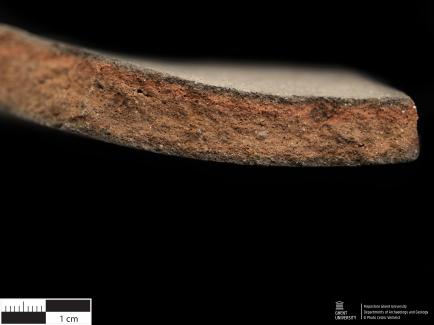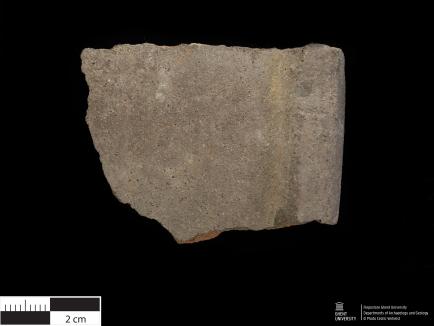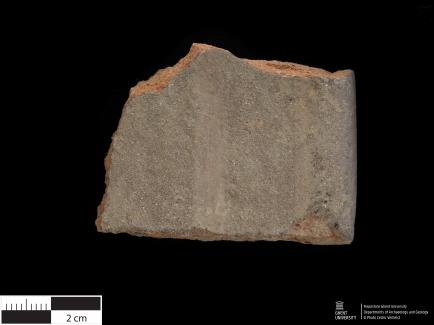Medieval - Grey reduced ware (6.GR.BE.0007)
Hand specimen pictures (macro & binocular)
Thin section pictures
Find location
- Category
- Grey reduced ware (Medieval)
- Fabric name
- Chronology
- Medieval > Late Medieval > 1200-1350
- Dating method(-s)
- morphology, radiocarbon dating
- Potters' mark
- No
- Additional information
- Radiocarbon date on a charcoal fragment from a related pit with ceramic wasters (KL20:S206): date between 1050 en 1260 AD (95,4% - RICH-23930)
Find location
- Site type
- Pottery production
- Location
- Belgium; West-Vlaanderen; Houthulst
- Site name
- Houthulst, Langemarkstraat (FLAZ-42)
- Excavation or Survey Team
- THV MRG (Monument Vandekerckhove nv; Ruben Willaert bvba; Gate nv)
- Additional contextual information
-
Clay extraction pit with ceramic wasters (S184, find inventory number 116). This particular site is part of a larger project: Fluxys – tracé Alveringem-Maldegem
Deelzone Lot 1&2 Lo-Reninge - Staden. Permit code: 2014/286 en 286 (2). d
- Slip
- No
- Slip color
- Glaze
- No
- Glaze type
- Glaze color
- Glaze additives
- Additional information
- Slip
- No
- Slip color
- Glaze
- No
- Glaze type
- Glaze color
- Glaze additives
- Additional information
- Surface color
- grey
- Surface texture
- Rough
- Fracture color
- orange
- Inclusions (non-plastics/tempering)
- quartz
- Matrix and voids
- some very small vesicles
- Diagnostic features
- Additional information
- Flepostore inventory nr.
- ARCH1.L1.A16
- Original inventory nr.
- A0006
- Collection
- Archaeological Department, Ghent University
- Type
- Covered thin section
- Comparable thin section(s)
- Matrix
-
Reduced with possible end-phase oxidization: color ranges from dark brown to redbrown to light brown (edge to core); dark brown (PPL), black (XP).
Homogenous matrix, non-calcareous without optical activity.
- ca. 50-65% - Inclusions
-
Quartz (++; mono, poly, r-sr, silt - medium sand, weathering, alteration), sedimentary rock detritus (+-), feldspars (+-; plagioclase; sr-r, ff, weathering/alternation), muscovite mica (-; el, ff), O/Fe (+-), amphibole/pyroxene (--; 2nd order colors), clay pellets (-).
The coarse fraction varies from medium to fine sand, the fine fraction from very fine sand to silt. Grains are generally sub-rounded to rounded. Overall the fabric is moderately to poorly sorted.
- ca. 30-40% - Voids
-
Many small planar voids and vughs, well aligned parallel to edge, no infill.
- ca. 10-15% - Diagnostic features
- The fabric is characterized by a homogenous reduced matrix with no optical activity and moderate porosity. Dominant quartz inclusions with common sedimentary rock, feldspars and opaques/iron oxides, few muscovite mica and clay pellets, rare amphibole/pyroxene. Overall moderate to poorly sorted.
- Additional information
- Two large clusters of quartz (mono, r-sr, fine to medium sand) with little matrix or cement between the grains. High content of (probable) iron oxides. Possible iron-rich sedimentary rock or extreme iron-rich sandy section in the clay? Similar observation to A0005.
- Sample type
- Pottery
- Inventory number
- 6.GR.BE.0007
- Collection
- Archaeological Department, Ghent University
- Donating institute/person
- Monument Vandekerckhove NV
- Host collection
- Temporal repository Monument Vandekerckhove NV
- Other samples available
- No
- Sample collection method
- Archaeological Excavation
Verdegem & Bracke 2019 b
- Full reference
-
Verdegem S. & Bracke M. 2019. Fluxys-gasleiding Alveringem-Maldegem. Archeologisch onderzoek Vol. 2. Lot 1&2: deelzone Lo-Reninge-Staden (Frontzone).
Cite this page as: Flepostore - https://flepostore.ugent.be/ceramics/6-gr-be-0007
Last modified: 2024-04-25.






